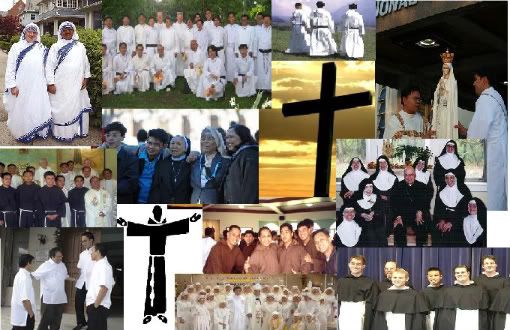Objections
To make matters worse, we play into the hands of the Tempter by listening to his objections, or building up for ourselves imaginary difficulties, which may never occur, forgetting that with the call comes the special “Grace of Vocation,” with which, as the Apostles assures us, “we can do all things.”
1. “I may not persevere.” - Were one to hesitate before a possible failure, little would be done in the world, but the Church wisely guards against this danger by giving the aspirant to Religion ample time, in the noviceship, to try if he is really called or suited for such a life. To leave or be dismissed from the house of probation is no disgrace, but simply shows God has other designs on the soul. St Joseph of Cupertino was several times refused admission into the Franciscan Order as unsuitable, He entered the Capuchins, but was sent away, after eight months’ trial, because it was thought he had no vacation. Out of compassion he was then received by the Franciscans, with whom he lived till his saintly death.
Suarez tells us we are to consider less our own strength in the matter than the help of grace, for it is in God we must particularly trust. He will not desert us if only we are faithful to His inspirations. If He calls those who do not seek Him, much more will He aid and protect those who have obeyed His call.
“If I did but know that I should persevere,” says the author of the Imitation, “and presently he heard within himself an answer from God: ‘Do now what thou wouldst do then, and thou shalt be very secure.’”
Instead of being frightened at the sight of a few who have been inconstant in their vocation, St. John Chrysostom says, why not consider the great number of those who, faithful to their engagements, find in Religion peace, happiness and salvation?
2. “My health may break down.” - No religious is ever dismissed, after Profession, through ill–health. Should God not give sufficient strength for the duties of the novitiate, it is an evident sign that He wants the novice elsewhere. Thus St. Benedict Joseph Labre, finding himself unable to persevere with either the Cistercians or Carthusians, and having tried in vain, for two years, to enter among the Trappists, saw that his vocation lay in another direction, the perfect imitation, in the world, of the humble, suffering life of the Master. Experience has proved in numberless cases that the regular Community life is of immense benefit to those of feeble health, and God rewards the generous spirit and trust of one willing to serve Him in the midst of infirmities, by giving new vigour and strength.
Pere Surin, S.J. advised his mother to become a Carmelite nun at the age of fifty–six. So delicate had she been that she required the constant attendance of four nurses, yet during the fifteen years she lived in the convent, observing all the austerities of the Rule, she never once entered the infirmary.
Another Carmelite, Madame Soyecourt, who died at the age of eighty, had never even abstained in the world on account of ill-health.
St. Bernard served God faithfully for sixty-three years, never relaxing his penances, fasting or labors, though from his entry into religion he was extremely delicate and constantly spat blood.
3. “I should break my parent’s heart.” – When the devil sees in anyone a religious vocation, he does everything possible to prevent him following that attraction. But of all the means he makes use of, the love of one’s parents is the most powerful and dangerous. He shows it to be so just and reasonable, he makes use of such specious sophisms, that the poor soul does not know to which voice to listen – that which call him or that which bids him go back.
St. Alphonsus Liguori declared that the hardest trial of all his life was when he made known to his father his determination of quitting the world. “Dear father, I see that you suffer for my sake. However, I must declare that I no longer belong to this world: God has called me, and I am determined to follow His voice.” For three hours the father clasped him in his arms weeping and repeating, “My son, do not leave me! Oh, my son, my son! I do not deserve this treatment.” If he had listened to this pathetic appeal the Church would have lost one of her grandest saints; fortunately he remembered the words of Him Who could call Himself “the kindest and gentlest of men”: “Do not think that I came to send peace upon earth: I came not to send peace but the sword. For I came to separate the son from the father, and the daughter from the mother; … he that loveth father or mother more than Me is not worthy of Me.”
A terrible responsibility rest on the conscience of some parents, who, through selfishness or misguided love, succeed in preventing their children from following the call of God, and unscrupulously withhold from Him those He is drawing to Himself.
They may have the satisfaction of keeping a little longer with them those to whom they have given birth, but they must answer one day to their Judge for the immense good they have hindered, and the souls of those lost through their fault.
Though it meant a big sacrifice, even a serious loss, no right-minded father would dream for a moment of forbidding a marriage which would bring to his child joy and good fortune; why then interfere with that holy alliance, made in heaven, which means far greater happiness?
St. Ambrose asks if it is just that a young girl should have less liberty in choosing God for her Spouse that she has in selecting an earthly one.
To the mother of a family who opposes the religious vocation of her daughter one might say: “You married, and you did well. Had you been forced to enter a convent, would you have done it?”
4. “I could do more good in the world.” – In a very exceptional case, and under circumstances not likely to be realised, this might be true, but such a statement generally shows a want of realization of the immense advantages of religious life, and the merit which comes from the living vows.
Would St. Francis, St. Dominic, or St. Ignatius have done more for God’s glory had they led the life of pious laymen, and would not the world have been poorer and heaven emptier if Nano Nagle, Catherine Macaule or Mary Aikenhead had refused the grace offered them?
5. “Good people are wanted in the world.” – But does God want ME there? If so, why did He give me a call to leave it? Surely I must take it for granted that He knows what is best for me and for His glory, and blindly follow His voice.
Pere Olivaint, one of the Jesuit Martyrs of the Commune, answers the objection of a young man who wished to remain in the world as follows: “My parents have plans for my future. …But what does God want? In that position which is offered to me men will hold me in great esteem. … But God? My natural taste moves me in that direction… But God? I shall certainly be able to save my soul in the world. …True, but does God wish that you should save it there?”
Granting that I have a clear vocation to the religious life, where I shall be far better able and more fitted to work for the welfare of my neighbor, I cannot persuade myself that I could do more good by going against the Will of God.
6. “I may be unhappy in the convent.” – Is the world, then, such an earthly paradise, so full of love, peace and happiness that no sorrows is to be found there? Religious may have much to suffer, days of trial and desolation to be endured, the grinding monotony of a never changing round of duties to be bravely faced, day by day, yet with St. Paul they can exclaim: “I super-abound with joy in the midst of my tribulations.”
“Father,” said an old Trappist monk, “I have so much consolation here amid all our austerities I fear I shall have none in the next world.”
“One evening in winter,” writes the Little Flower, “I was about my lowly occupation; it was cold and dark. Suddenly I heard the harmony of several musical instruments outside the convent, and pictured to myself a richly furnished, brilliantly-lit drawing-room, resplendent with gilding and decorations; young ladies, tastefully dressed were sitting there and paying each other many a vain compliment. Then I looked on the poor invalid I was tending. For the music I had her complaints; for the gilded drawing-room, the brick walls of an austere convent, lighted only by a feeble glimmer. The contrast was exceedingly sweet. The dim light of earthly joys was denied me, but the light of God shone all around. No, I would not have bartered those ten minutes taken by my deed of charity for ten thousand years of worldly diversions.”
“Here in Carmel,” she adds, “a prey to bodily and spiritual anguish, I am happier than I was in the world; yes, happier even than in my home, and by my beloved father’s side.”
7. “Perhaps I never had a vocation.” –Many persons have been tried by great doubts about their vocation, sometimes fearing they had deceived themselves, and that it would be impossible for them to secure their salvation in the religious state. All sweetness and devotion seems to have vanished; everything is wearisome, prayer, spiritual reading, even recreation, a clear sign, they think, that God never wished them to enter !
Theologians, and at their head St. Liguori, lay it down as a principle that even if one should enter religion without a vocation and persevere through the novitiate, God will certainly give one at the moment of pronouncing one’s vows. To hesitate or doubt when that step has been taken would be treason: “He who puts his hand to the plough and looks back, is not worthy of Me.”
Moreover, that repugnance and even dislike, which some suffer from during the whole of their religious life, is not a sign of want of vocation, if they persevere; God is only trying their fidelity to increase their merit.
8. “Wait! Wait! Wait!”
“If I were you I would not be in such a hurry.” –- But Jesus would not let the young man remain even to bury his father: “Let the dead bury their dead,” He said, “and come thou and follow Me – make haste and tarry not.”
“You do not know the world.” --I know it is my worst foe, the friend and helper of my deadly enemy, Satan, and a danger I should fear and fly from.
“You are too young, wait a while.” -- Should I wait till the foul breath of the world has tarnished the beauty of the lily of my soul, which God loves for its spotless purity and wants for himself. “It is well for a man who has borne the yoke from his youth.”








